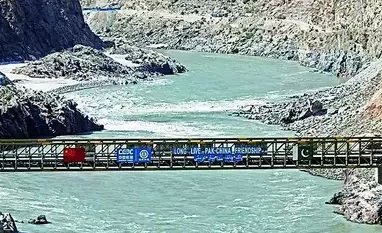In a significant move, India has officially notified Pakistan about its intention to modify the Indus Waters Treaty (IWT), citing new and unexpected challenges that require changes to the six-decade-old agreement. The notice, issued under Article XII(3) of the treaty, emphasizes the need for a new agreement between the two countries to address emerging concerns. This decision comes after India had already raised the issue in January 2023 due to ongoing disagreements over Indian hydropower projects.
What is the Indus Waters Treaty?
Signed in 1960, the Indus Waters Treaty was designed to regulate the sharing of water from the Indus River and its tributaries between India and Pakistan. According to the treaty, India has control over the Eastern Rivers—Beas, Ravi, and Sutlej—while Pakistan has rights over the Western Rivers—Indus, Chenab, and Jhelum. The World Bank played a crucial role in brokering the treaty, which also led to the creation of a Permanent Indus Commission to manage disputes.
Despite the tense relations between India and Pakistan over the decades, the IWT has stood as a rare example of successful water-sharing cooperation, surviving wars, political unrest, and numerous disagreements. However, recent disputes over hydropower projects have strained the treaty’s effectiveness in dealing with contemporary challenges.
The Dispute Over Hydroelectric Projects
India’s decision to seek changes stems from long-standing disputes with Pakistan over two Indian hydropower projects located on the Kishanganga and Chenab rivers. Pakistan has repeatedly raised concerns about these projects, questioning their compliance with the IWT. Over the years, both countries have attempted to resolve the issue through the treaty’s established mechanisms, but no final resolution has been reached. India’s notice to Pakistan signals its frustration over the slow and unresolved nature of these disputes.
How Are Disputes Resolved Under the Treaty?
The Indus Waters Treaty includes a three-step dispute resolution process under Article IX to resolve disagreements between the two nations:
- Indus Commissioners from both countries first attempt to resolve the issue through bilateral discussions.
- If these talks fail, a Neutral Expert is appointed to provide clarification.
- If the issue remains unresolved, it can be escalated to a Court of Arbitration for a final decision.
While this process has been instrumental in managing disputes, the current situation illustrates the limitations of the treaty in addressing complex issues like hydropower development.
Why Does India Want to Renegotiate?
India’s call for a renegotiation of the treaty reflects its concerns about a host of evolving challenges that were not considered when the IWT was originally framed in the 1960s. The country points to factors such as rapid population growth, environmental pressures, and the impact of cross-border terrorism as reasons why the treaty needs to be updated. Additionally, India highlights that the IWT does not adequately address modern threats like climate change, which has exacerbated water scarcity and altered river dynamics in the region.
India’s demand for modifications underscores its view that the treaty’s current provisions are outdated and insufficient to deal with today’s geopolitical and environmental realities.
Key Events Since January 2023
Several key developments have occurred since India’s initial notice to Pakistan earlier this year:
- April 2023: India held a meeting to review the procedure for making changes to the treaty, signaling its commitment to updating the agreement.
- July 2023: The Court of Arbitration declared that it had jurisdiction to handle the disputes over the Kishanganga and Ratle hydropower projects. However, India disagreed with this claim and expressed its reluctance to engage in the Court of Arbitration’s process.
- September 2023: India participated in the Neutral Expert process to address the ongoing dispute but maintained its stance against joining the parallel Permanent Court of Arbitration (PCA) process.
These actions reflect India’s growing dissatisfaction with the existing treaty mechanisms and its desire for a more relevant and modernized agreement.
The Path Forward
India’s insistence on renegotiating the Indus Waters Treaty highlights a broader need to address the shifting landscape of water-sharing in the region. Climate change, technological advancements, and evolving geopolitical tensions are all factors pushing India to seek updates to the treaty. Through its recent actions, India is signaling that the original terms of the IWT, while successful in the past, must be revised to reflect the realities of the 21st century.
As discussions between the two nations continue, the future of the Indus Waters Treaty remains uncertain. Whether through bilateral talks, international mediation, or new agreements, both India and Pakistan will need to navigate these challenges to ensure the sustainable management of the vital water resources shared between them.


